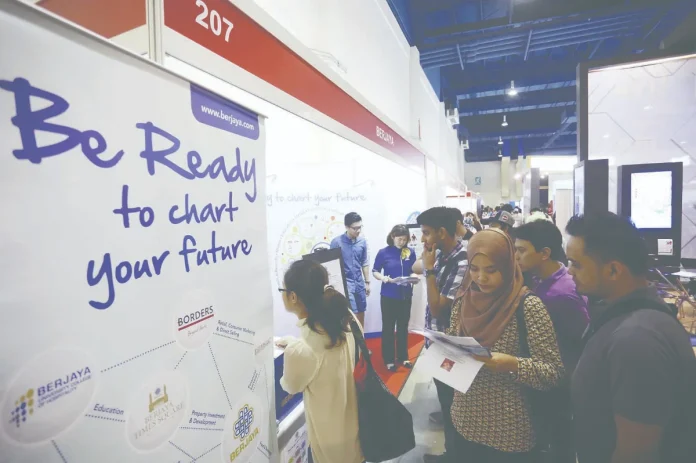In a tough 2025 job market, fresh graduates must focus on AI skills, adaptability, and visibility to build lasting careers.
LET’S not sugarcoat it. If you are a fresh graduate in 2025, the entry-level job market is rough.
In Malaysia, youth unemployment is hovering around 10%. Globally, entry-level openings are down, hiring requirements are rising and AI is replacing many of the tasks that used to be stepping stones into full-time roles.
Here is what I’ve been telling young jobseekers I meet: don’t get stuck playing a short game in a long-game world.
It is tempting to panic when applications go unanswered or when even “entry-level” roles demand years of experience.
ALSO READ: “Difficult to cope with weather cost of living” — Gen Z staff sends handwritten resignation letter
But the real opportunity now isn’t just about getting hired; it is about getting noticed, and more importantly, getting ready for the next five years, not just the next five months.
Reports show that while hiring is tight, there is growing demand in areas like digital technology, healthcare, sustainability and the green economy.
The challenge is that employers are no longer focused on what is written on paper.
They are looking for something harder to quantify – readiness. And increasingly, that means two things: adaptability and AI literacy.
The second one needs to be taken seriously. AI literacy today is not about typing clever prompts into ChatGPT or generating funny images to share online.
It is about understanding how AI is changing workflows, business models, customer behaviour and showing that you know how to apply it, not just experiment with it.
If you are a fresh grad right now, waiting around for job openings may not be your best move.
You need to create visibility through real, self-initiated work. Start with something small.
Build a basic productivity tool, create a data dashboard using public datasets or explore a resume-scoring script using one of the many free low-code platforms available. And once you have built something, share your process and progress.
One well-written LinkedIn post explaining what you have done can sometimes reach more decision-makers than 10 polished resumes. Recruiters may not call after your 30th application but someone may message you after your third post.
That is the new landscape. You are not just applying anymore but also attracting.
Many graduates I meet feel stuck because they are conditioned to believe opportunity only comes through formal channels like job portals, interview panels or internship programmes.
But informal visibility now moves faster and more meaningfully than traditional routes.
You don’t need a title to start adding value – just start.
Document your learning, ask thoughtful questions and be generous in giving credit to others. Over time, this will become your professional presence.
That doesn’t mean giving up on the job market. Keep applying, tailor your applications, explore platforms like Maukerja, JobStreet and LinkedIn, and take freelance or short-term roles if they help build relevant experience.
But while you are doing that, keep your long-term strategy in mind. The long game means upskilling with intention.
You don’t have to learn everything, focus on what is aligned with growing sectors like AI, environmental solutions, cloud infrastructure or health innovation.
Build personal projects that reflect these interests and show what you can do, not just what you have studied.
Reach out to peers, mentors, former lecturers or alumni. Your next opportunity could come from a recommendation, not a listing.
Most importantly, document your growth. Let people see not just your outcomes but how you are thinking and improving. And stay consistent.
Momentum takes time but visibility grows with every honest, thoughtful post, every project update and every conversation you start or respond to. This is what long-term thinking looks like in 2025.
Mindset matters too. I left a comfortable general manager role in a private hospital to build a business with no safety net, just a clear purpose and the relationships I had built over time.
It didn’t happen overnight; it took focus, adjustment and plenty of patience.
But the belief was simple: the only way to build something meaningful is to keep showing up for it.
If you are just starting your career, you may not land your dream job immediately. You may accept something that is not ideal just to get going.
That is okay, just don’t stay idle. Use every opportunity to learn. Keep a record of what you are learning.
Ask questions, even if you feel unsure and always have a side project that keeps you challenged: not just for your resume but for your confidence.
Malaysia’s job market will eventually recover. The AI transition will stabilise. New industries will mature.
But those who spend these in-between years building a portfolio, a network and a reputation for learning will be in a far stronger position when those doors open.
You are not just waiting for someone to offer you a seat at the table; you are shaping your own space so that when they do, you will already have something to bring.
Play the long game, kids. It still works.
Ts Elman Mustafa El Bakri is CEO and founder of HESA Healthcare Recruitment Agency and serves on the Industrial Advisory Panel for the Department of Biomedical Engineering, Universiti Malaya.
Comments: letters@thesundaily.com








